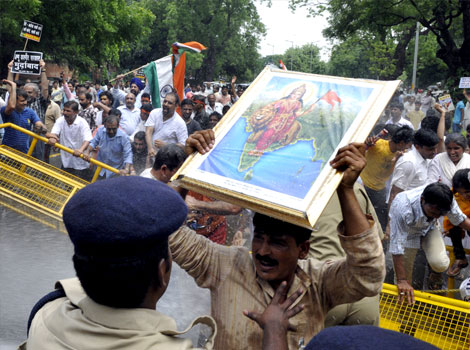New Delhi, Feb 17: The Supreme Court said on Monday that people have a fundamental right to protest against a law but the blocking of public roads is a matter of concern and there has to be a balancing factor.
Hearing pleas over the road blocks due to the ongoing protests at Shaheen Bagh against the Citizenship Amendment Act (CAA), a bench comprising Justices S K Kaul and K M Joseph said its concern is about what will happen if people start protesting on roads.
Democracy works on expressing views but there are lines and boundaries for it, the bench said.
It asked senior advocate Sanjay Hegde and advocate Sadhana Ramachandran to talk to Shaheen Bagh protestors and persuade them to move to an alternative site where no public place is blocked.
The matter has been posted for next hearing on February 24.
People have a fundamental right to protest but the thing which is troubling us is the blocking of public roads, the bench said.
Solicitor General Tushar Mehta said Shaheen Bagh protestors should not be given a message that every institution is on its knees trying to persuade them on this issue.
The apex court said that if nothing works, we will leave it to the authorities to deal with the situation.
Protestors have made their made their point and the protests have gone on for quite some time, it said.
Restrictions have been imposed on the Kalindi Kunj-Shaheen Bagh stretch and the Okhla underpass, which were closed on December 15 last year due to the protests against CAA and Register of Citizens.
The top court had earlier said the anti-CAA protesters at Delhi's Shaheen Bagh cannot block public roads and create inconvenience for others.
The apex court was hearing an appeal filed by advocate Amit Sahni, who had approached the Delhi high court seeking directions to the Delhi Police to ensure smooth traffic flow on the Kalindi Kunj-Shaheen Bagh stretch, which was blocked by anti-CAA protesters on December 15.
While dealing with Sahni's plea, the high court had asked local authorities to deal with the situation keeping in mind law and order.
Separately, former BJP MLA Nand Kishore Garg has filed a petition in the apex court seeking directions to the authorities to remove the protestors from Shaheen Bagh.
One of the pleas has sought laying down of comprehensive and exhaustive guidelines relating to outright restrictions for holding protests or agitations leading to obstruction of public place.
In his plea, Garg has said that law enforcement machinery was being "held hostage to the whims and fancies of the protesters" who have blocked vehicular and pedestrian movement from the road connecting Delhi to Noida.
State has the duty to protect fundamental rights of citizen who were continuously being harassed by the blockage of arterial road, it said.
"It is disappointing that the state machinery is muted and a silent spectator to hooliganism and vandalism of the protesters who are threatening the existential efficacy of the democracy and the rule of law and had already taken the law and order situation in their own hand," the plea had said.
In his appeal, Sahni had sought supervision of the situation in Shaheen Bagh, where several women are sitting on protest, by a retired Supreme Court judge or a sitting judge of the Delhi High Court.
Sahni has said in his plea that protests in Shaheen Bagh has inspired similar demonstrations in other cities and to allow it to continue would set a wrong precedent.
 Jammu/Srinagar, Aug 12: Jammu and Kashmir Chief Minister Omar Abdullah today said the state government has decided to order a judicial inquiry into the communal clashes in Kishtwar district that left two persons dead and 20 others injured.
Jammu/Srinagar, Aug 12: Jammu and Kashmir Chief Minister Omar Abdullah today said the state government has decided to order a judicial inquiry into the communal clashes in Kishtwar district that left two persons dead and 20 others injured.





Comments
Add new comment